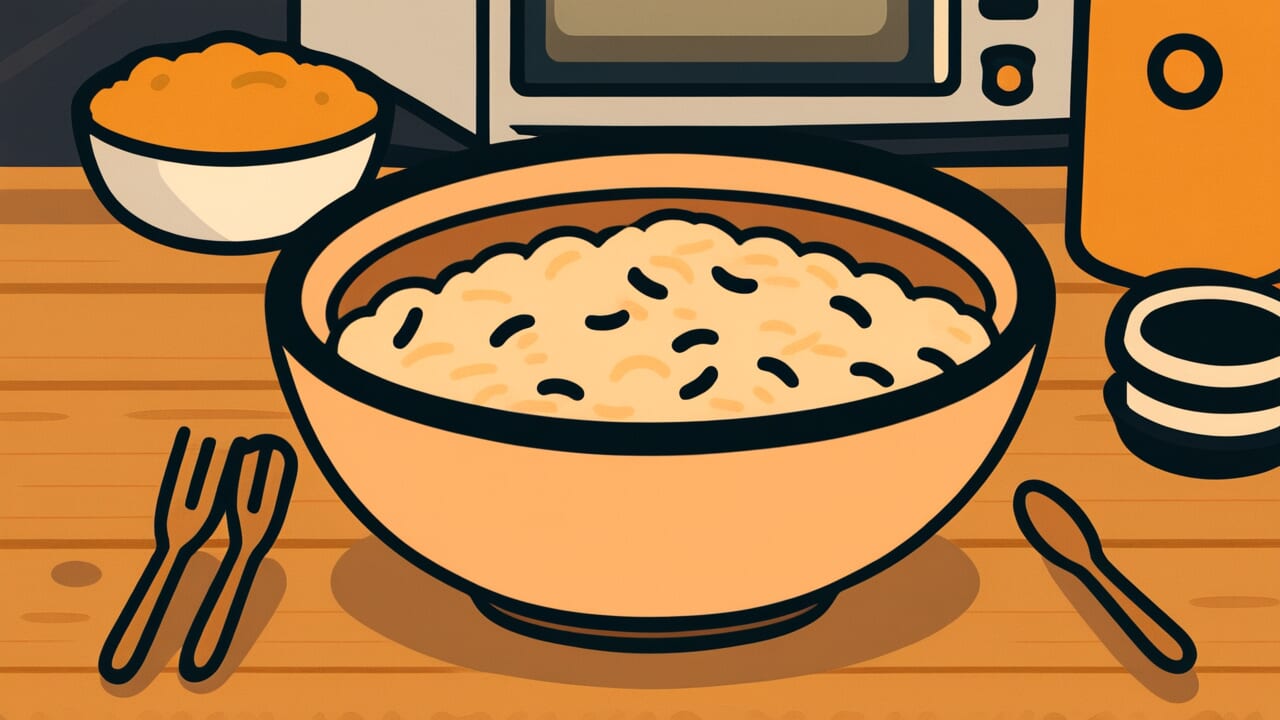How to Read “When you have it, rice meals”
Aru toki wa kome no meshi
Meaning of “When you have it, rice meals”
This proverb expresses the reality of life. Sometimes you can afford luxuries, but not always.
It shows an attitude of accepting life’s ups and downs. There are times when you have financial comfort and times when you don’t.
People use this saying when returning to a frugal lifestyle after spending lavishly. It also applies when explaining unstable income situations.
Sometimes it serves as a warning. Things may be good now, but the future is uncertain.
This expression uses food as an easy-to-understand example. It conveys life’s uncertainty in a way everyone can relate to.
Even today, it describes how people adjust their lifestyle based on income. You might eat out when you get a bonus but cook at home normally.
Origin and Etymology
No clear written records document the exact origin of this proverb. However, the structure of the phrase offers interesting insights.
The expression “aru toki” doesn’t just mean “at some time.” It means “when you have money” or “when you have resources.”
The phrase “rice meals” strongly reflects the historical period when this proverb was born.
From the Edo period through the Meiji era, common people mainly ate barley or mixed grains. White rice was a luxury.
People could only eat it on special days or when they had extra money. Normally they ate rice mixed with barley, millet, or barnyard millet.
They could cook pure white rice only during celebrations or when income was good.
This proverb may have a second half that’s been dropped. Some regions say “When you have it, rice meals; when you don’t, barley meals.”
This might have been the original form. The parallel structure concisely expressed life’s ups and downs.
Because this saying came from ordinary people’s lived experience, it used food as the most relatable example. It captured the reality of moving between luxury and simplicity.
Usage Examples
- I eat out all the time when my bonus comes in, but “when you have it, rice meals,” so next month it’s back to saving money
- Freelance income isn’t stable, so I need to save with the spirit of “when you have it, rice meals”
Universal Wisdom
“When you have it, rice meals” has been passed down because it captures a fundamental truth. Human life is inherently unstable.
In any era, no prosperity lasts forever. No hardship lasts forever either. Life repeats good times and bad times like waves.
The deep wisdom of this proverb lies in teaching acceptance rather than lamenting this reality. If times are good now, enjoy them honestly.
But also know this won’t last forever. Our ancestors understood that such calmness and flexibility are necessary for surviving life.
Modern society has a strong desire for stable living. However, looking back at human history, complete stability has never existed.
Change itself is the normal state. Recession follows prosperity, then prosperity returns again. Individual lives follow the same pattern.
There are periods when income increases and periods when it decreases.
This proverb teaches us wisdom to accept such fluctuations as life’s natural rhythm. Don’t fear them.
When times are good, be grateful and enjoy them. When times are tough, endure and be creative.
People who can do both are the ones who can live strongly in any era.
When AI Hears This
The human brain calculates happiness not by “the current state itself” but by “how it compares to the past.”
Research by Nobel Prize winner Daniel Kahneman shows people react to “changes from a reference point” rather than absolute wealth.
When you’re poor, eating rice meals brings great joy. But that’s not because of rice’s inherent value.
It’s because you’re using “not having it” as your reference point.
Even more interesting is the human trait called “hedonic adaptation.” This is the phenomenon of getting used to any good situation.
Research shows lottery jackpot winners return to almost the same happiness level as before winning after one year.
When you can eat rice meals every day, your brain resets that as the new reference point. Then rice alone isn’t satisfying anymore.
Now you want side dishes.
This proverb is frighteningly accurate because it recognizes a fact. Human happiness depends not on “what you have” but on “where you place your reference point.”
When annual income rises from 3 million to 5 million yen, happiness doesn’t last. That’s because the brain makes 5 million the new baseline.
Understanding this psychological mechanism reveals something important. Gratitude is the act of consciously lowering your reference point.
Lessons for Today
This proverb teaches modern people the importance of flexibility in accepting life’s waves. Today, we seek stability too much.
We feel anxious about even small changes. But income rising and falling, busy periods alternating with relaxed ones—these are actually natural.
What matters is not getting carried away during good times. And not losing hope during hard times.
When you get a bonus, honestly celebrate and enjoy a little luxury. But also keep in mind this won’t happen every month.
Such balanced perspective becomes wisdom for living in today’s uncertain times.
With more freelancing and side jobs, work styles have diversified. Income fluctuations are bigger than before.
That’s why this proverb’s teaching has modern relevance. Don’t fear change. Be someone who can adapt to change.
That becomes the strength to keep moving forward in any situation. Your life has waves too.
But you have the ability to ride those waves.



Comments